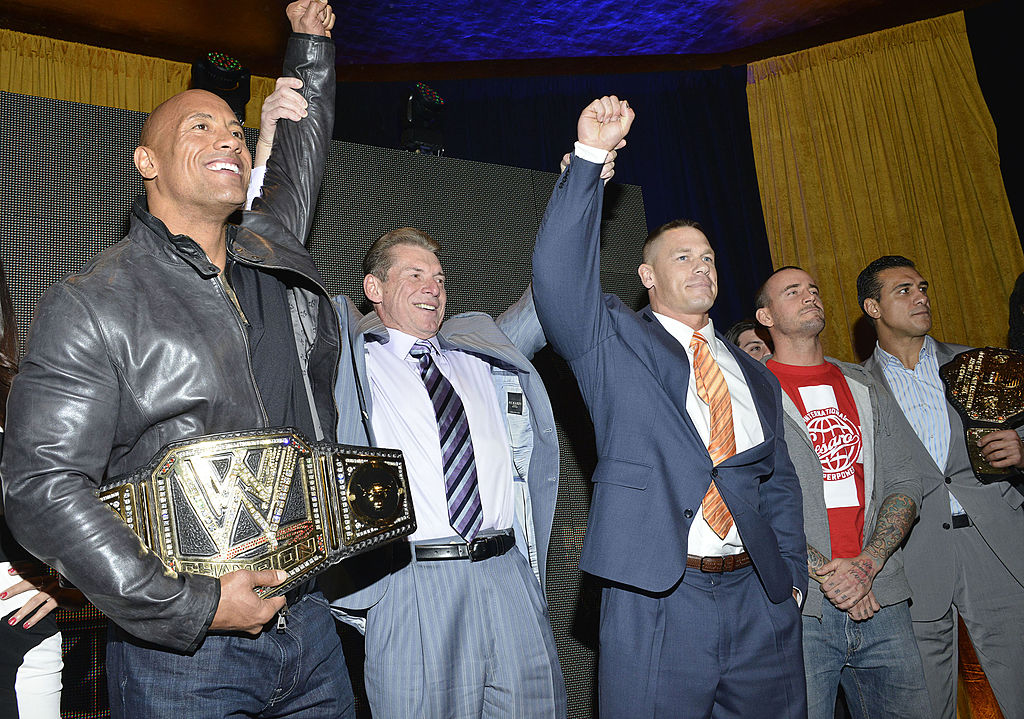If you watched the end of WWE's Royal Rumble show last weekend, the planned main event for April's WrestleMania seemed obvious. Cody Rhodes won the titular match, pointed at the WrestleMania logo, and then turned his attention to longtime champion Roman Reigns to unambiguously indicate that the two would have a rematch of last year's main event—this time, presumably, with Cody finally getting his much-delayed triumph.
DO THE WORK.
— WWE (@WWE) January 28, 2024
FINISH THE STORY.@CodyRhodes just won the Men's #RoyalRumble Match for the second year in a row! The American Nightmare has his sights set on @WWERomanReigns as the Road to #WrestleMania is underway! pic.twitter.com/RkHT2oAsLT
If you watched the press conference after the Royal Rumble, it was obvious that WWE had no idea how to handle the latest lawsuit against its four-decade boss, Vince McMahon, which accused him of yet more disgusting acts of sexual misconduct. (McMahon resigned from his executive chairman role right before the show as sponsors threatened to bail.) Paul Levesque, known as Triple H when he wrestled, took questions from reporters and niche media personalities after the event in his capacity as head of creative. While some questions were the bland softballs that always litter these interactions, Levesque was wholly unprepared for the ones about his ex-boss and father-in-law. Levesque admitted to not reading the lawsuit, said "It’s an amazing week for us," and went on to add, "I don’t even want to get bogged down in the negatives of it."
His buddy Shawn Michaels, who leads talent development, didn't fare much better on Thursday in his own call with media, failing to recall any specific policies designed to make WWE's Performance Center a safe place. “I won’t lie, I couldn’t care less what anybody puts on a piece of paper," he said, also noting by way of defense, "I have a daughter that comes here every week."
Rather than accept past shortcomings and embrace transparency, WWE's playbook for handling this scandal is distancing the current company from their iconic figurehead as much as possible. Pay no attention to the man who was in charge for 40 years, pretty much. “He’s gone. So he’s not there. He’s gone,” said Netflix content chief Bela Bajaria when asked about McMahon on Wednesday, following a multi-billion-dollar deal from the streamer to acquire rights to WWE's Raw. It's a far cry from when McMahon first "retired" after a Wall Street Journal article detailed hush-money payments to multiple women, after which his daughter Stephanie led "Thank you Vince" chants on TV in his honor.
But the McMahon story isn't going away quite like WWE wishes it would, and this is where Cody Rhodes's storyline path gets involved. Apparently, he isn't a shiny enough object for this PR plan to work. With the creative team facing another injury to top star CM Punk, and the absence of Brock Lesnar due to his alleged implication in McMahon's perversity, WWE reeled in the biggest possible fish in an attempt to overload the news cycle and supercharge Mania's star power. On their Friday show Smackdown, a dejected-looking Cody said, without any real explanation, that he would be declining his chance to main event Mania and win the championship. Instead, his role will be played by one of the biggest wrestling celebrities of all-time: 51-year-old Dwayne "The Rock" Johnson, now set to perform in his first match in basically 11 years.
According to wrestling journalist Dave Meltzer, the company "felt this was better to change the news flow away from Vince. Cody was the plan. Dwayne was going to face him later, maybe next year's Mania, maybe (in Saudi Arabia). Shit happens with Vince and Punk, the Vince thing ends up worse than they thought and they changed the plan."
For Johnson, the benefits are several. He's on the board of directors for the UFC-WWE parent company, and his comeback will no doubt bring in more money in the short term than the relatively limited fame of Rhodes. He's also part of a spring football league that he can cross-promote with Mania, and after the box-office disappointment of his last movie, Black Adam, wrestling is an ecosystem he can return to where he's still locked in at the top of the food chain.
WWE fans online have reacted very negatively to a hard-working fan favorite getting bumped so unceremoniously by a movie star. But WWE is more insulated from the will of its fanbase than ever, so guaranteed are their billions from broadcasters and foreign nations. And anyway, the type of fan who would buy a ticket to a WWE show only to voice their displeasure with the product doesn't really exist anymore, because WWE has become less of a monopoly even as it's achieving those record profits. AEW is an accessible alternative; other smaller companies tour regularly; Japanese shows are available to anyone with an internet connection. That's not to say these companies are necessarily virtuous (AEW has its own share of accused creeps), but unlike the days of mere cable and VHS, WWE's audience consists of people who like WWE, not just fans in general. Rhodes's demotion is frustrating to some of that audience. The allegations against McMahon should be sickening and enraging to all. But nobody has to eat the slop just to keep watching pro wrestling.






